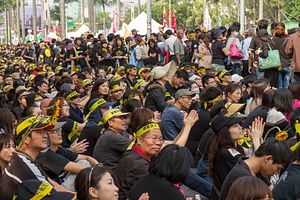Zhang Zhijun, the head of mainland China’s Taiwan Affairs Office (TAO) will arrive in Taiwan tomorrow for a four-day visit. It will be the first visit to Taiwan by the PRC’s top official for cross-strait relations. Xinhua was not shy about trumpeting the historic significance of the meeting, calling it “one small step for Zhang, one giant leap for cross-Strait relations.” The article even explicitly compared the importance of Zhang’s visit to that of the first moon landing.
Zhang will be in Taiwan from June 25 to June 28. Zhang will meet with counterpart Wang Yu-chi, the director of Taiwan’s Mainland Affairs Council (MAC), in a follow-up to their historic February meeting in mainland China. This round of talks is expected to work on expanding the consensus reached in February, including an agreement to set up regular communication mechanisms between TAO and MAC. MAC, however, has promised that the two men will not discuss any “sensitive political topics,” Taiwan’s Central News Agency reports.
Interestingly, Zhang will largely avoid Taipei itself. South China Morning Post reports that skipping the island’s capital is Zhang’s attempt to avoid political controversy. Already the Taiwan Solidarity Union has promised to stage protests against Zhang throughout his tour of Taiwan; it’s highly likely that such protests would be strongest in Taipei. SCMP indicates that Zhang’s visit has already been postponed at least once because the KMT was worried about a political incident.
Much has changed since Zhang and Wang’s February meeting in mainland China. In March, massive protests dubbed the Sunflower Movement showed public unease with a planned Cross-Strait Services Trade Agreement — and by extension, revealed deep uncertainty about the current trajectory of cross-strait relations. The Sunflower Movement caught both Taiwan’s ruling KMT Party and Beijing off-guard. Since then, the PRC has been trying to determine how to modify its approach to cross-strait relations to maximize public support in Taiwan. PRC officials have continued to stress the need for continued development of cross-strait ties while also working to increase cross-strait exchanges involving students, labor unions, and other groups that offered staunch support for the Sunflower Movement.
To that end, Zhang will spend three of his four days in Taiwan talking with different groups of people about cross-strait relations and Beijing’s policies toward Taiwan. Xinhua listed planned meetings “with experts, college students, farmers, fishermen, members of minority groups, religious people, [and] businessmen as well as spouses from the mainland.” Xinhua expressed its hope that Zhang’s visit, and his attempt to connect with average Taiwanese, will help dispel “the noises and tricks trumpeting sentiment against the mainland.”
These meetings are designed, as Xinhua put it, to be a symbol of “the mainland’s care for the island’s public opinions,” but they also have a more concrete political purpose. Beijing wants to understand how public opinion turned so sharply back in March, and talking with different stakeholders is a necessary step toward figuring this out. Such meetings also represent Beijing’s attempt to broaden support for cross-strait relations by expanding PRC contacts beyond the traditional connections with KMT officials and business people.
Still, not everyone is satisfied with Zhang’s schedule. Lin Fei-fan, one of the student leaders of the Sunflower Movement, said Zhang should be willing to talk directly with Sunflower Movement participants instead of interacting with a pre-selected group of students. Meanwhile, the opposition DPP continues to insist that Wang Yu-chi not make any formal agreements or discuss any sensitive issues during Zhang’s visit. DPP Director of China Affairs Chao Tien-lin said that cross-strait talks “cannot bring harm to Taiwan’s interests, nor circumvent the mechanisms of democratic oversight to undertake political negotiations of any kind.”

































